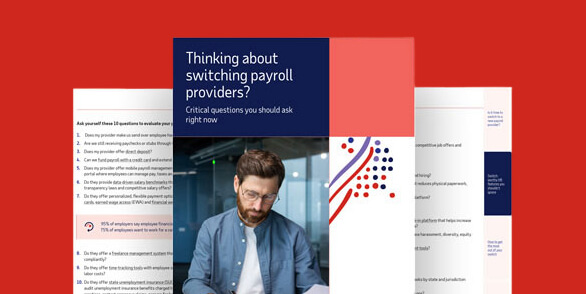Pay stubs, also known as pay statements or wage statements, are like the decoder rings of payroll. They help employees decipher their paychecks and are useful to employers when solving wage and hour disputes or tax discrepancies. Depending on the state, pay stubs may also be part of payroll compliance.
Table of Contents
What is a pay stub?
A pay statement is a document that summarizes an employee’s gross pay, taxes and deductions, and net pay. It can be provided in printed format with a paycheck or made available electronically. In some states, employees must consent to receive electronic pay statements.
What are pay stubs used for?
Employers and employees use pay statements to verify that compensation is accurate. In addition, lenders often ask to see pay stubs as proof of income or employment before approving a loan.
Why are pay stubs important?
Pay stubs are essential because they provide transparency between employers and employees and help prevent pay-related conflicts. They’re also a requirement in most states.
What information is on a pay stub?
The information on a pay statement varies according to an employee’s tax liability, benefit contributions and state or local requirements. Most, however, include some of the following details:
- Contacts and dates
The employer’s name and address, the beginning and end dates of the pay period, and the employee’s name and address are typically displayed at the top of a pay stub. Some states also require an employee identification number. - Pay rates and hours
Pay rates – regular, overtime, double time, etc. – and the hours worked at each rate are particularly important for employees who are eligible for overtime. - Gross earnings
Gross pay is the amount an employee earns before any taxes or deductions. - Employee taxes
Taxes deducted from an employee’s pay commonly consist of federal income tax, Federal Insurance Contribution Act (FICA) taxes (Medicare and Social Security), and state and local taxes, if applicable. - Benefit deductions
Employees who participate in employer-sponsored benefit programs, like health coverage or retirement savings, can contribute to these plans via payroll deductions. - Employer taxes and contributions
Employers generally are responsible for federal and state unemployment taxes, the employer portion of FICA taxes and any other state or local taxes that apply. If they offer benefits, they may also pay part of their employees’ health coverage premiums and match employee contributions to retirement plans. - Garnishments
Wage garnishments are required if an employer receives a court order to withhold a portion of an employee’s earnings for child support, defaulted loans, tax levies or similar reasons. - Paid time off (PTO)
Pay stubs usually show the accrued hours for vacation, sick or personal days. - Net pay
Net, or take-home pay, is the amount paid to an employee after all payroll deductions are processed.
Do states require employers to provide pay stubs?
Although no federal laws require employers to provide pay statements to employees, many state and local jurisdictions do. These mandates pose potential complications for businesses with employees in multiple states, since each one has its own set of rules.
Whether a pay statement can be provided electronically is one such rule. The variations of it are as follows:
- States with no requirements
A few states allow employers to decide whether to provide electronic or paper pay statements without government oversight. - Access/print states
In some states, employers using electronic pay statements must ensure employees can easily view and print them. - Opt-in states
Employees receive printed pay statements by default unless they consent to receive an electronic version. - Opt-out states
Employers can provide an electronic pay statement, but any employee who requests a paper pay statement must receive one.
Do states require employers to provide pay stubs?
The information contained within a pay statement is subject to federal and state employment recordkeeping laws. The IRS requires employment tax records to be saved for four years after filing fourth-quarter taxes for the year. Under the Fair Labor Standards Act (FLSA), employers must retain payroll records for three years and save documentation showing how they determined wages for two years. If a state has different requirements than the federal government, employers must abide by whichever length of recordkeeping is greater.
Best practices for pay stubs
Pay statements that are inaccurate or improperly delivered can confuse employees and increase the risk of legal liability. Here are some best practices to avoid these situations:
- Know all state and local requirements
State and local government websites, as well as payroll industry associations, are good sources of information on pay statement requirements. - Include the necessary information
Most states require employee pay statements to contain specific information, such as hours and rates of pay, deductions, gross and net pay, pay period beginning and end dates, and total hours worked. Employers should also be aware of any industry-related requirements or best practices that apply. - Make pay stubs easy to access
Many states specify how employers must make pay statements available to employees. Additionally, employees applying for a loan often appreciate the ability to get their pay statements without undue stress. - Work with a payroll service provider
Payroll providers typically include pay stub delivery as part of their service and may assist employers with state and local pay statement requirements.
Frequently asked questions about pay stubs
Is a pay stub the same as a pay statement?
Yes, pay stub is another name for pay statement. It also may be referred to as a paycheck stub, wage statement or pay slip.
How do I get pay stubs?
Employees who receive printed paychecks generally find their pay statement attached to the check. Those who have electronic payment delivery, like direct deposit, typically can access their pay statement through an online portal provided by their employer or submit an official request through human resources.
Why should employers provide a pay stub?
Employers usually provide pay statements because it’s required by a state or local jurisdiction. Pay stubs can also help prevent employee confusion.
What should you do with your pay stubs?
It’s generally good practice for employees to save pay statements for at least one year. By doing so, they can verify the accuracy of their annual Form W-2, Wage and Tax Statement when preparing their individual income tax returns.
What do you do if you don't have pay stubs?
Employees who don’t have pay stubs and need to prove their source of income can request copies from their employer. Alternatively, lenders sometimes accept bank statements or copies of previous tax returns.
What do you do if you lose your pay stub?
Pay statements contain personal information that could be subject to identity theft. It’s important to retain them in a safe place and securely dispose of them. Employees who lose pay stubs may want to monitor their credit report and alert their bank and credit reporting agencies so they can flag any suspicious activity. If a copy of the lost pay statement is needed, employees can usually request one from their employer’s HR or payroll department. However, the actual process varies by employer.
This guide is intended to be used as a starting point in analyzing an employer’s payroll obligations and is not a comprehensive resource of requirements. It offers practical information concerning the subject matter and is provided with the understanding that ADP is not rendering legal or tax advice or other professional services.






